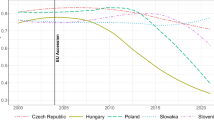Abstract
The broad theme is the relationship between the EU accession process up to 2004 and democratic consolidation in Central & Eastern Europe. The particular focus is on the EU's political conditions for candidate countries and their systemic impacts on the new democracies of CEE. This theme is explored applying theoretical and comparative lessons from the democratization literature. The EU's political impacts are examined by identifying cross-national trends of progress towards democratic consolidation, noting the scope for and limitations of the EU's political conditionality and looking at national government responses as well as the role of other domestic actors in accession states. In the end, conditionality did contribute towards consolidation but mainly in terms of the institutionalization of these new democracies without much evidence of deeper effects. Also, there are negative aspects of EU accession with its top-down procedures and emphasis on bureaucratic efficiency more than domestic participation.
Similar content being viewed by others
Author information
Authors and Affiliations
Rights and permissions
About this article
Cite this article
Pridham, G. Assessing Democratic Consolidation in Central & Eastern Europe: The European Dimension. Acta Polit 41, 342–369 (2006). https://doi.org/10.1057/palgrave.ap.5500165
Published:
Issue Date:
DOI: https://doi.org/10.1057/palgrave.ap.5500165




